Verónica Álvarez
Adaptive Multi-task Learning for Probabilistic Load Forecasting
Dec 23, 2025Abstract:Simultaneous load forecasting across multiple entities (e.g., regions, buildings) is crucial for the efficient, reliable, and cost-effective operation of power systems. Accurate load forecasting is a challenging problem due to the inherent uncertainties in load demand, dynamic changes in consumption patterns, and correlations among entities. Multi-task learning has emerged as a powerful machine learning approach that enables the simultaneous learning across multiple related problems. However, its application to load forecasting remains underexplored and is limited to offline learning-based methods, which cannot capture changes in consumption patterns. This paper presents an adaptive multi-task learning method for probabilistic load forecasting. The proposed method can dynamically adapt to changes in consumption patterns and correlations among entities. In addition, the techniques presented provide reliable probabilistic predictions for loads of multiples entities and assess load uncertainties. Specifically, the method is based on vectorvalued hidden Markov models and uses a recursive process to update the model parameters and provide predictions with the most recent parameters. The performance of the proposed method is evaluated using datasets that contain the load demand of multiple entities and exhibit diverse and dynamic consumption patterns. The experimental results show that the presented techniques outperform existing methods both in terms of forecasting performance and uncertainty assessment.
Reliable Programmatic Weak Supervision with Confidence Intervals for Label Probabilities
Aug 05, 2025Abstract:The accurate labeling of datasets is often both costly and time-consuming. Given an unlabeled dataset, programmatic weak supervision obtains probabilistic predictions for the labels by leveraging multiple weak labeling functions (LFs) that provide rough guesses for labels. Weak LFs commonly provide guesses with assorted types and unknown interdependences that can result in unreliable predictions. Furthermore, existing techniques for programmatic weak supervision cannot provide assessments for the reliability of the probabilistic predictions for labels. This paper presents a methodology for programmatic weak supervision that can provide confidence intervals for label probabilities and obtain more reliable predictions. In particular, the methods proposed use uncertainty sets of distributions that encapsulate the information provided by LFs with unrestricted behavior and typology. Experiments on multiple benchmark datasets show the improvement of the presented methods over the state-of-the-art and the practicality of the confidence intervals presented.
Multi-task Online Learning for Probabilistic Load Forecasting
Feb 06, 2025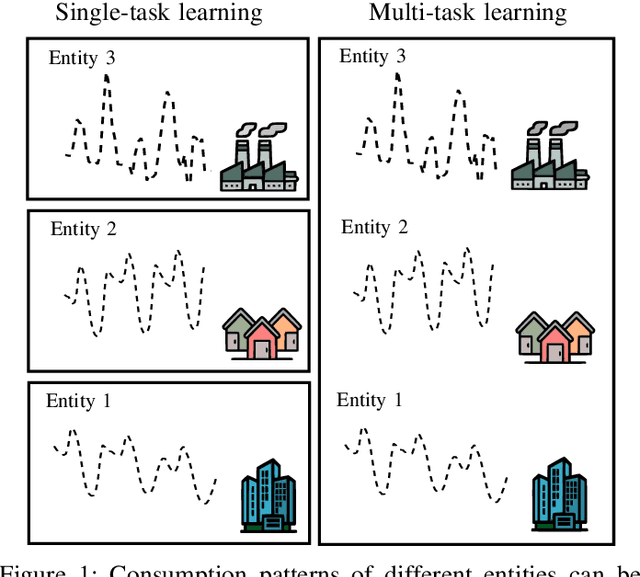


Abstract:Load forecasting is essential for the efficient, reliable, and cost-effective management of power systems. Load forecasting performance can be improved by learning the similarities among multiple entities (e.g., regions, buildings). Techniques based on multi-task learning obtain predictions by leveraging consumption patterns from the historical load demand of multiple entities and their relationships. However, existing techniques cannot effectively assess inherent uncertainties in load demand or account for dynamic changes in consumption patterns. This paper proposes a multi-task learning technique for online and probabilistic load forecasting. This technique provides accurate probabilistic predictions for the loads of multiple entities by leveraging their dynamic similarities. The method's performance is evaluated using datasets that register the load demand of multiple entities and contain diverse and dynamic consumption patterns. The experimental results show that the proposed method can significantly enhance the effectiveness of current multi-task learning approaches across a wide variety of load consumption scenarios.
Supervised Learning with Evolving Tasks and Performance Guarantees
Jan 09, 2025Abstract:Multiple supervised learning scenarios are composed by a sequence of classification tasks. For instance, multi-task learning and continual learning aim to learn a sequence of tasks that is either fixed or grows over time. Existing techniques for learning tasks that are in a sequence are tailored to specific scenarios, lacking adaptability to others. In addition, most of existing techniques consider situations in which the order of the tasks in the sequence is not relevant. However, it is common that tasks in a sequence are evolving in the sense that consecutive tasks often have a higher similarity. This paper presents a learning methodology that is applicable to multiple supervised learning scenarios and adapts to evolving tasks. Differently from existing techniques, we provide computable tight performance guarantees and analytically characterize the increase in the effective sample size. Experiments on benchmark datasets show the performance improvement of the proposed methodology in multiple scenarios and the reliability of the presented performance guarantees.
Minimax Forward and Backward Learning of Evolving Tasks with Performance Guarantees
Oct 24, 2023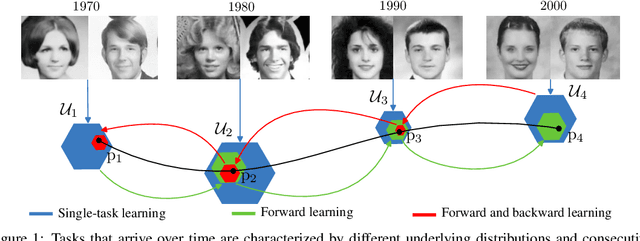
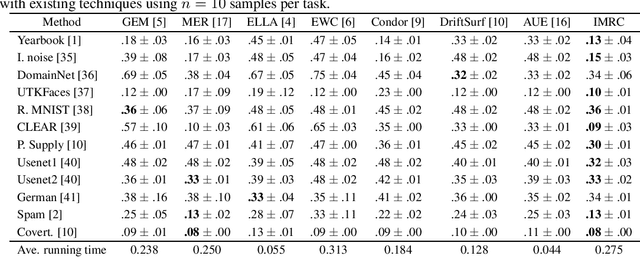
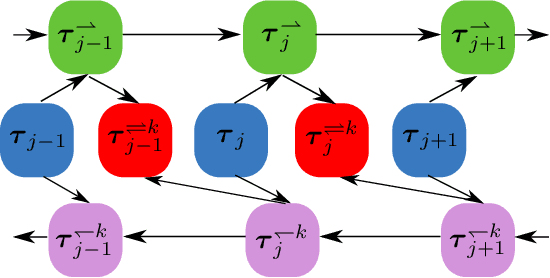

Abstract:For a sequence of classification tasks that arrive over time, it is common that tasks are evolving in the sense that consecutive tasks often have a higher similarity. The incremental learning of a growing sequence of tasks holds promise to enable accurate classification even with few samples per task by leveraging information from all the tasks in the sequence (forward and backward learning). However, existing techniques developed for continual learning and concept drift adaptation are either designed for tasks with time-independent similarities or only aim to learn the last task in the sequence. This paper presents incremental minimax risk classifiers (IMRCs) that effectively exploit forward and backward learning and account for evolving tasks. In addition, we analytically characterize the performance improvement provided by forward and backward learning in terms of the tasks' expected quadratic change and the number of tasks. The experimental evaluation shows that IMRCs can result in a significant performance improvement, especially for reduced sample sizes.
Minimax Classification under Concept Drift with Multidimensional Adaptation and Performance Guarantees
May 31, 2022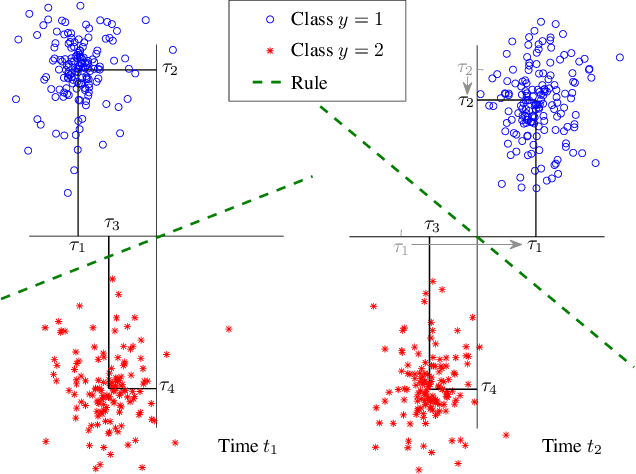
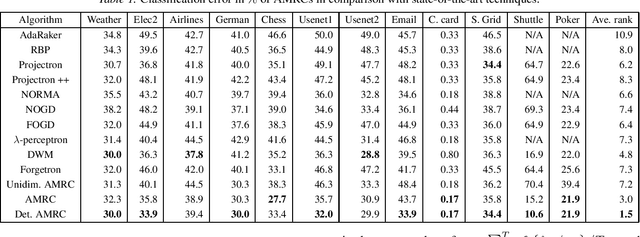
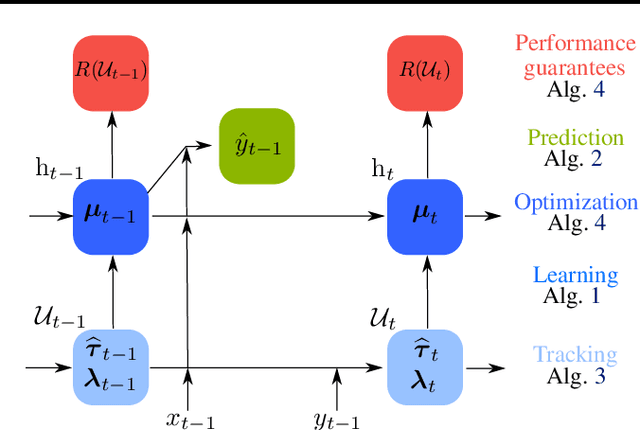
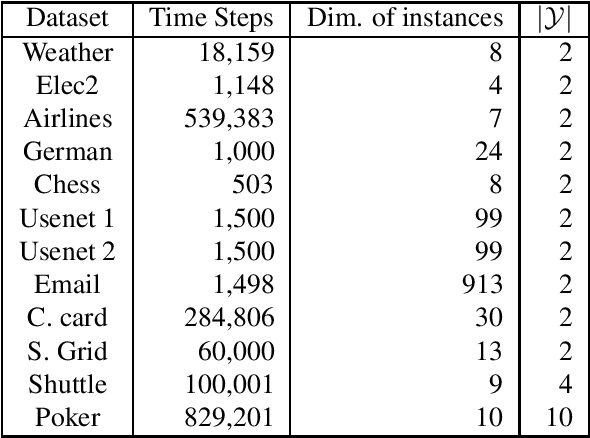
Abstract:The statistical characteristics of instance-label pairs often change with time in practical scenarios of supervised classification. Conventional learning techniques adapt to such concept drift accounting for a scalar rate of change by means of a carefully chosen learning rate, forgetting factor, or window size. However, the time changes in common scenarios are multidimensional, i.e., different statistical characteristics often change in a different manner. This paper presents adaptive minimax risk classifiers (AMRCs) that account for multidimensional time changes by means of a multivariate and high-order tracking of the time-varying underlying distribution. In addition, differently from conventional techniques, AMRCs can provide computable tight performance guarantees. Experiments on multiple benchmark datasets show the classification improvement of AMRCs compared to the state-of-the-art and the reliability of the presented performance guarantees.
Probabilistic Load Forecasting Based on Adaptive Online Learning
Nov 30, 2020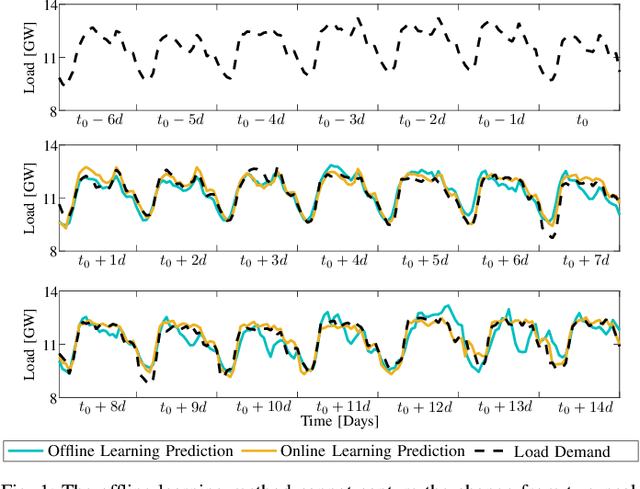
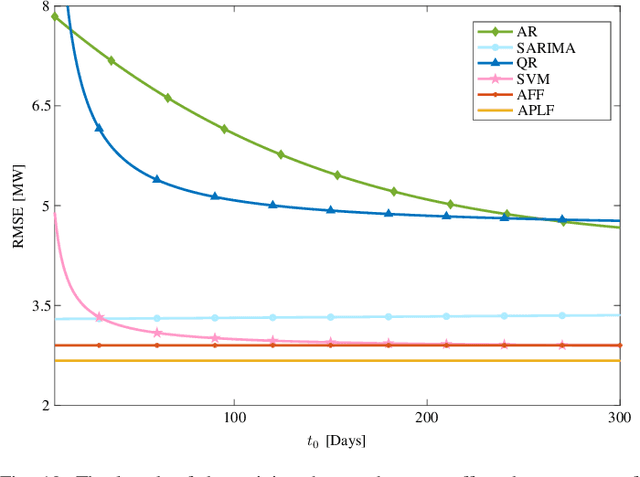


Abstract:Load forecasting is crucial for multiple energy management tasks such as scheduling generation capacity, planning supply and demand, and minimizing energy trade costs. Such relevance has increased even more in recent years due to the integration of renewable energies, electric cars, and microgrids. Conventional load forecasting techniques obtain single-value load forecasts by exploiting consumption patterns of past load demand. However, such techniques cannot assess intrinsic uncertainties in load demand, and cannot capture dynamic changes in consumption patterns. To address these problems, this paper presents a method for probabilistic load forecasting based on the adaptive online learning of hidden Markov models. We propose learning and forecasting techniques with theoretical guarantees, and experimentally assess their performance in multiple scenarios. In particular, we develop adaptive online learning techniques that update model parameters recursively, and sequential prediction techniques that obtain probabilistic forecasts using the most recent parameters. The performance of the method is evaluated using multiple datasets corresponding with regions that have different sizes and display assorted time-varying consumption patterns. The results show that the proposed method can significantly improve the performance of existing techniques for a wide range of scenarios.
 Add to Chrome
Add to Chrome Add to Firefox
Add to Firefox Add to Edge
Add to Edge